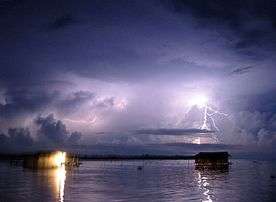Catatumbo River
| Catatumbo River | |
 | |
| Countries | Colombia, Venezuela |
|---|---|
| States | Norte de Santander Department, Zulia |
| Source | |
| - elevation | 3,850 m (12,631 ft) |
| Mouth | Maracaibo Basin |
| Length | 500 km (311 mi) |
| Basin | 22,317 km2 (8,617 sq mi) |
The Catatumbo River (Spanish: Río Catatumbo) is a river rising in northern Colombia, flowing into Lake Maracaibo in Venezuela. The Catatumbo River is approximately 340 kilometres (210 mi) long. It forms a part of the international boundary between the two countries.
Together with the nearby Río Escalante, Catatumbo is a producing area for cocoa beans of the Criollo cultivar.
Catatumbo lightning
The "Relámpago del Catatumbo" or "Faros del Catatumbo" (Catatumbo lightning) is a phenomenon that occurs over the marshlands at the Lake Maracaibo mouth of the river, where lightning storms occur for about 10 hours a night, 140 to 160 nights a year, for a total of about 1.2 million lightning discharges per year. The light from this storm activity can be seen up to 40 kilometres (25 mi) away and has been used for ship navigation; it is also known as the "Maracaibo Beacon" for this reason.[1]
References
- ↑ "Fire in the Sky". Retrieved 2007-12-14.
The flashes are visible up to 40 kilometres away and have been used as a natural lighthouse for centuries; which is why this semi-permanent storm is also known as the "Faro de Maracaibo", or "Maracaibo Beacon".
Coordinates: 9°20′39″N 71°42′38″W / 9.34417°N 71.7106°W